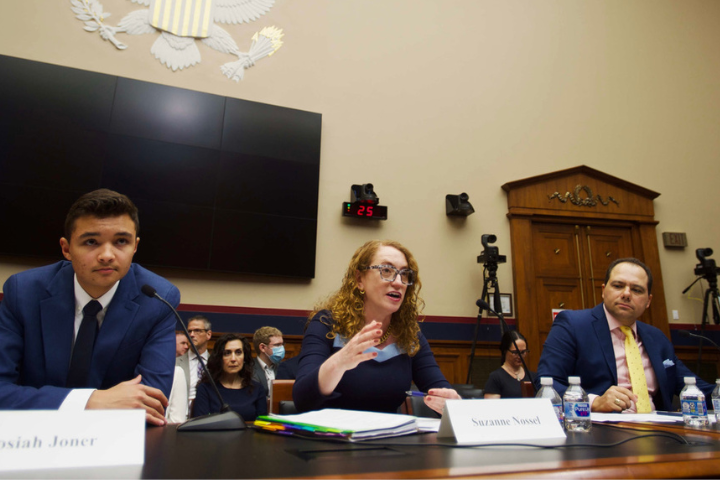Updated 2/14
(MIAMI)– As Florida lawmakers returned last week to Tallahassee, they introduced a string of bills that would unfavorably impact free speech and free expression, freedom of the press, young people’s use of social media and LGBTQ+ rights.
Taken together, these bills would further undermine basic Constitutional rights, a trend that PEN America is fighting in federal court through its lawsuit on book bans against Escambia County. The bills PEN America is tracking this legislative session and our critical perspective on each follows:
HB 1: Social Media Use for Minors and SB 1788: Age Verification for Social Media Platforms
HB 1 would ban Floridians under the age of 16 from creating a new account on a social media platform, and require the termination of preexisting accounts held by this age group.
PEN America opposes this bill on the grounds that it is not tailored to minimize the potential harm that minors may encounter on social media, but instead bans them from accessing publicly disseminated and constitutionally protected speech. While the state has an interest in protecting minors from harm, minors also enjoy First Amendment rights, and only under specific and well-defined circumstances should the state limit their access to information.
PEN America has also submitted opposition to SB 1788: Age Verification for Social Media Platforms. This bill mirrors much of the language in HB 1 and also seeks to bar all minors under 16 from social media sites.
HB 757/SB 1780: Defamation, False Light, and Unauthorized Publication of Name or Likenesses
PEN America opposes HB 757 and its counterpart in the Senate, SB 1780. Both threaten to undermine freedom of the press and open the door for a torrent of litigation for punitive damages against news outlets and journalists. These bills attempt to instill fear in journalists and their sources by creating a “rebuttable presumption” that the news outlet acted with “actual malice”—a legal term of art for the current standard of defamation suits by public figures—if any of the content published has “relied on an anonymous source for the statement.“
PEN has also submitted it’s opposition to SB 1780, which goes even further than HB 757, decimating the journalist’s privilege to protect sources, creating increased liability for the content of speech (such as potential damages for allegations that a government official discriminated on the basis of race or sex), and including other infringements on the free press. PEN America opposes HB 757 and SB 1780 because they would undermine free speech and freedom of the press by threatening long-standing protections afforded to journalists. If passed, both bills risk chilling publicly protected speech that is critical of politicians, public officials, and government actors, contrary to the principles of the First Amendment.
HB 901 – Display of Flags by Governmental Entities
HB 901 states that a “governmental entity”—explicitly naming public schools, colleges, and universities as examples—may not display a flag that represents a “political viewpoint, including, but not limited to, a politically partisan, racial, sexual orientation and gender.”
PEN America opposes the bill for explicitly targeting racial and LGBTQ+ identities and symbols, its overly-vague messaging, and its likely infringement on Floridians’ First Amendment rights. Notably, while HB 901 makes an exception for private individuals expressing private speech, the lines between public and private speech are often blurred at public colleges and universities, and the bill includes no guidance that clarifies the distinction. As it is, HB 901 risks chilling the speech of Floridians of color and LGBTQ+ individuals at these institutions.
SB 1372 – Educator Preparation Programs
SB 1372 states that instruction in teacher preparation program courses may not “include a curriculum or instruction that teaches identity politics,” or instruction that is “based on theories that systemic racism, sexism, oppression, and privilege are inherent in the institutions of the United States and were created to maintain social, political, and economic inequities.”
PEN America opposes SB 1372 because it would result in viewpoint discrimination contrary to free speech and expression. SB 1372 incorporates elements of the “Stop WOKE Act” (HB 7 2022)—which is currently enjoined in higher education—and fails to define the “identity politics” that it forbids. SB 1372 runs contrary to the First Amendment and principles of academic freedom, chilling speech across the Florida public education system as part of the larger trend to instill censorship in Florida’s public schools.
SB 470: Postsecondary Education Students
SB 470 would deprive any student that “promotes” a federally recognized foreign terrorist organization of their in-state tuition and state financial aid, without defining what it means to “promote” such an organization. Stakes are even higher for students with F-1 visas, who would be reported to the Department of Homeland Security if their speech is interpreted as “promotion.”
PEN America opposes SB 470 because of its failure to define what it means to “promote” terrorism or distinguish it from protected forms of speech, which runs contrary to the First Amendment. Individual school administrators and staff would be the ones determining what counts as “promotion” of a foreign terrorist organization, which risks the undue chilling of speech.
Katie Blankenship is the inaugural director of PEN America’s Florida office.





